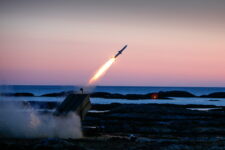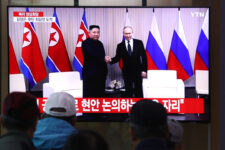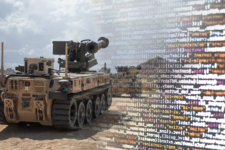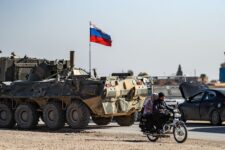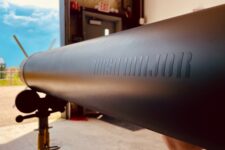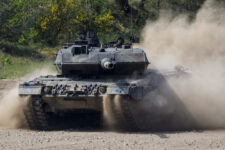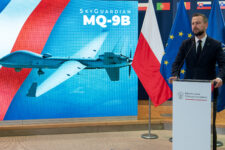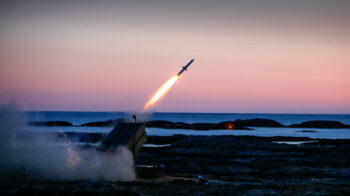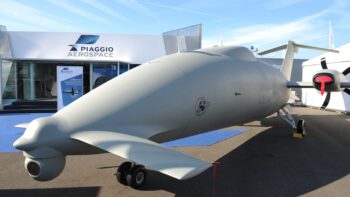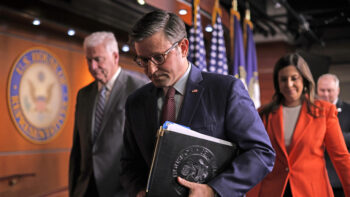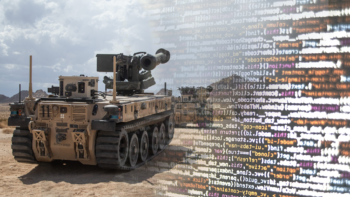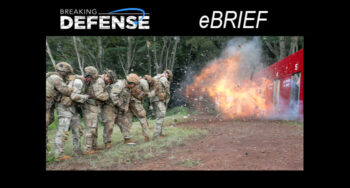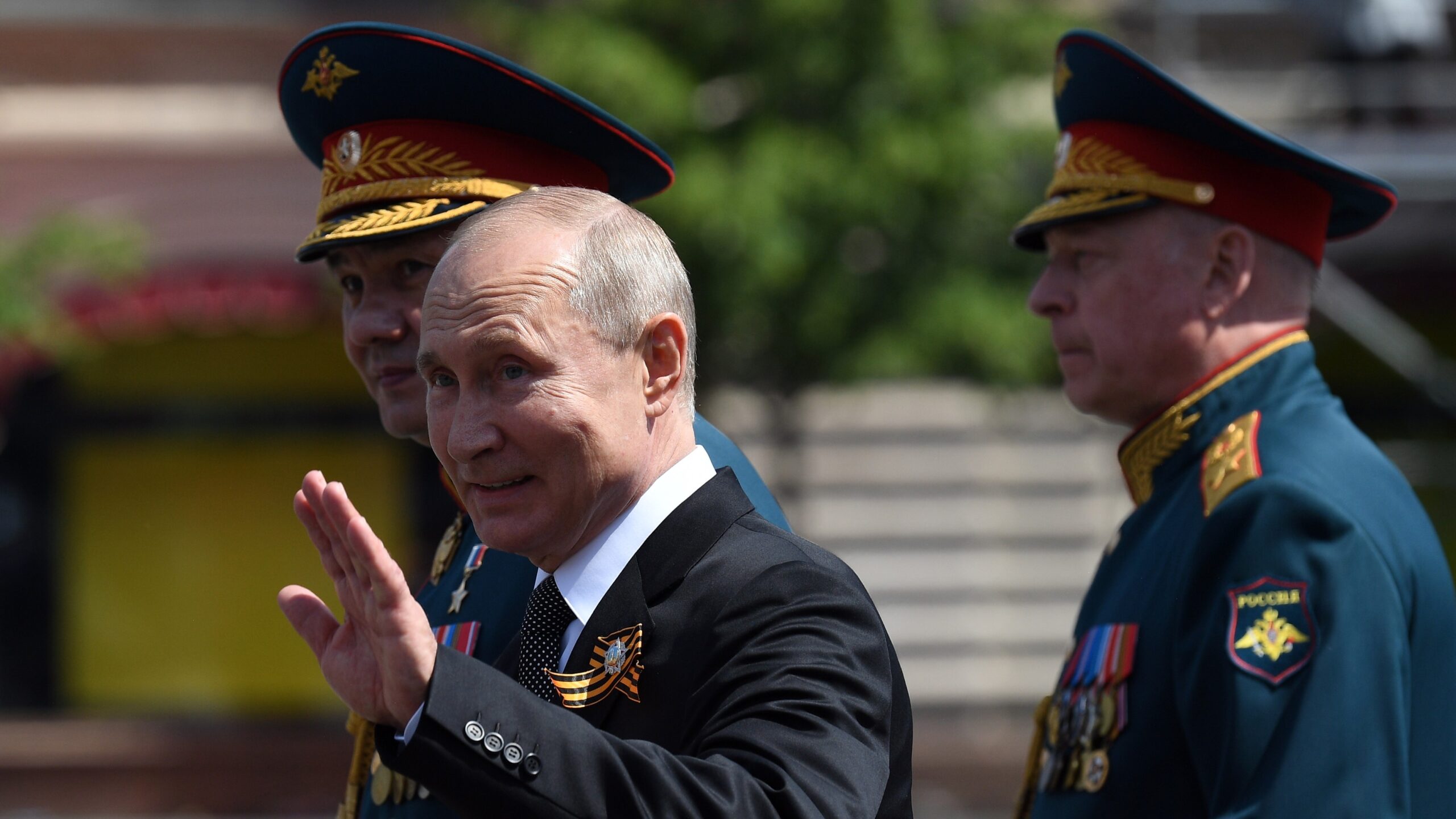
Russian President Vladimir Putin, Commander-in-chief of the Russian Armed Forces, during a Victory Day military parade in Red Square marking the 75th anniversary of the victory in World War II, on June 24, 2020 in Moscow, Russia. (Ramil Sitdikov – Host Photo Agency via Getty Images )
FT. LAUDERDALE and WASHINGTON — Today’s announcement by Russian President Vladimir Putin of a “partial” military mobilization may have been designed as a show of force following setbacks in Ukraine. But outside Russia it is being met with early skepticism from experts, while inside the country the announcement has triggered protests in the streets of Moscow and a rush of flights out of the country.
Putin’s speech was followed by a statement by Russian Defense Minister Sergei Shoigu, who put forth a target number of 300,000 call-ups with military experience, reportedly to include some men over the age of 60. But that number may be more of a notional one, with early BBC reports saying that the actual document signed by Putin has no cap on the number of potential conscripts. Other commentators pointed out that this decree was purposefully “written to be as vague as possible.”
But even hitting that 300,000 number — a larger force than was arrayed around Ukraine in February for the start of the invasion — may be a challenge, Ben Hodges, a retired US Army. Lt. Gen who served as Commanding General of US Army Europe, told Breaking Defense today.
The results from this mobilization could be even more dismal than the Russian Army’s previous Spring conscription drive, Hodges said, which netted only about 40 percent of the target of roughly 134,000 the military was seeking to pull into its ranks. Hodges, now a senior advisor to Human Rights First, a non-profit, nonpartisan international human rights organization, noted that Russia is already forcing some members of the military to extend their deployments.
“I do not see them reaching this number [of 300,000] this time either,” he said, “and what is complicating their efforts now is that there is an active effort in the Russian armed force — their version of ‘stop-loss’ — where the end dates for service terms of their contracted, professional soldiers are being extended against their will.”
And, he said, “even if the Russians are able to mobilize significant numbers, think about how many months [it is] going to take for them to emerge as operational formations,” he noted. That’s before even getting into questions of what equipment is available to arm the new forces, given Russia’s well-catalogued resupplying issues.
In a Twitter thread, Christopher Dougherty of the Center for a New American Security added that flowing new conscripts into existing units might not work out well for the Russians overall. “The resultant units can lack cohesion absent strong junior leadership, which wasn’t a Russian strength before the war and has only gotten worse due to heavy attrition of officers,” he wrote.
RELATED: As Ukraine counterattacks, Russia’s military facing steep artillery, resupply challenges
The BBC reported that the first-order targets of this conscription are reserve officers that have some level of previous military experience — a short-term fix, potentially, but given that many of these reserve officers are in the 60s, hardly a full solution.
Samuel Charap of RAND, meanwhile, indicated in a Twitter thread of his own that the military impact of mobilization should not cause observers to miss the messaging from Moscow.
“The battlefield impact of this move is a big question mark. We’ll have to see. The messaging, however, is clear. Putin is raising the stakes. He’s not going to downsize his war aims as he did in late March,” Charap wrote. “When a leader has to say ‘this is not a bluff’ he knows he has a credibility problem. I think it’s fair to say that Russia has concluded its efforts to affect its adversaries’ decision making have failed. Their doctrine, [for what it’s worth], suggests upping the ante when that happens.”
The “bluff” statement refers to a part of Putin’s speech that many took as a hardly veiled threat of the potential use of nuclear weapons. Given that implied threat, other European nations were cautious with their responses. Lithuania has put a rapid response force on alert, while British Under-Secretary of State in the Foreign Office Gillian Keegan told British press that Putin’s nuclear hints are “something that we should take very seriously.”
Speaking to a small group of reporters the night before Putin’s speech, Bjørn Arild Gram, Norway’s defense minister, summed the situation up by saying, “How will this play out in the coming days and weeks? I don’t know, but things are happening on the Russian side.”
Gram also tied what was then an expected announcement of mobilization directly to the success Ukraine has had on the battlefield. “I think they [Ukraine] still have some momentum. And this, of course, is a huge setback for the Russians, really. It’s not going as they thought,” he said.
“So the pressure on Putin and the Russian regime has increased. And so, then the question, What will you then do? Maybe we see some of that now. But it’s difficult to know what will happen.”
Dramatic, Delayed Announcement
The mobilization news did not come out of the blue, with the Kremlin keeping most of the rest of the world waiting on Tuesday evening for what had been rumored to be a major address by Putin announcing a full — rather than partial — mobilization of the country and a call-up of all military-age personnel.
As the clock inched towards 11 pm Moscow time on Tuesday, Kremlin insider Margarita Simonyan, the editor of the state-run television network RT, apparently learned that the speech had been postponed and wrote on her Telegram channel “go to bed, everyone.”
When Putin did finally appear, early Wednesday local time, his speech included a diatribe of recycled accusations about the “neo-Nazi regime” in Ukraine and then the announcement he had signed a decree for a “partial mobilization.” He referred to the current government in Kyiv as the “descendants of [Stepan] Bandera and Nazi karateli” (punishers or armed goons like the Nazi Party SA in the 1930s) who “kill people, torture them, throw them in prison, settle scores, crack down on, torment civilians.”
Bandera, a WWII-era Ukrainian nationalist leader whose soldiers fought against the Red Army in pursuit of a post-war independent Ukraine, is frequently invoked by Putin and his leadership as a catch-all bogeyman. His name has been increasingly invoked when attacking the government of Ukraine President Volodymyr Zelenskiy, who happens to be Jewish, as lording over a repressive Nazi government.
Putin’s televised address followed on the heels of the announcement that the Kremlin would hold referendums in four regions of Russia that are presently under armed occupation by the Russian military: the Donbas regions of Lugansk and Donetsk and the southern Ukraine oblasts of Kherson and Zaporizhye. The US has preemptively called the expected referendums “shams.”
There have been repeated assessments by those inside of Russia that a major mobilization could precipitate an internal revolt and have negative economic repercussions as well.
Shortly after the announcement by Putin, Andrei Kolesnikov, a senior fellow at the Carnegie Endowment, told CNN that “mobilization is fraught with serious discontent in society. That is precisely why he decided to make a partial mobilization, rather than a full one. In the long run, he laid a land mine under his regime; in the short run, he will face sabotage.”
Concerns about the aftereffects of mobilization decree run deeper than just the possibility of a public backlash. The numbers of military-age personnel that would be pulled out of the society could also cause the collapse of a number of industries due to the impact on the size of the available labor force.
Flights departing Moscow and St. Petersburg today. The @AP is reporting international flights departing Russia have either sold out or skyrocketed in price after Putin announced a mobilization of reservists.
Search SVO, VKO, DME for Moscow airports and LED for St. Petersburg. pic.twitter.com/LV2PrkwPD9
— Flightradar24 (@flightradar24) September 21, 2022
Already, there has been a clear impact. According to Reuters, one-way flights out of Russia began selling out shortly after Putin’s speech, with the price for some flights shooting up five-times the normal cost. And videos and photos have begun circulating on social media of protests in Moscow — the first large, visible domestic opposition since the early days of Russia’s invasion. Protests in Putin’s backyard are notable, as until now conscripts have been largely drawn from more remote regions in Russia with less political power.
The political consequences of just such a future and continued failure by the Russian Army are catastrophic for Putin, which is what is prompting him to double down on trying to overpower and overrun Ukraine with sheer numbers of Russian personnel.
“It is clear that this is Putin trying to find a way out of this failing military campaign,” said a senior researcher at the Casimir Pulaski Foundation, one of Poland’s major defense and foreign affairs think-tanks.
“Putin is now fighting for his life — not just politically but also physically,” he said. “The question is how long the Russian population will continue to allow him to make them pay the price for his personal ambitions.”
Pentagon unveils new $2.5 billion package for Ukraine; USAI funds depleted
“At my direction, the United States will continue to work relentlessly to strengthen Ukraine’s position in this war over the remainder of my time in office,” said President Joe Biden.
